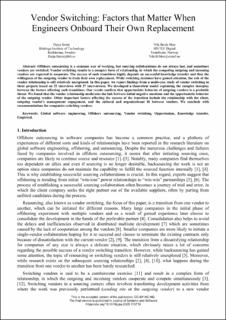Vendor Switching: Factors that matter when engineers onboard their own replacement
Peer reviewed, Journal article
Accepted version
Permanent lenke
https://hdl.handle.net/11250/2995649Utgivelsesdato
2020Metadata
Vis full innførselSamlinger
- Publikasjoner fra CRIStin - SINTEF AS [5801]
- SINTEF Digital [2501]
Sammendrag
Offshore outsourcing is a common way of working, but sourcing collaborations do not always last, and sometimes vendors are switched. Vendor switching results in a complex form of relationship, in which the competing outgoing and incoming vendors are expected to cooperate. The success of such transitions highly depends on successful knowledge transfer and thus the willingness of the outgoing vendor to train their own replacement. While switching decisions have gained attention, the role of the vendor relationship is still relatively unexplored. In this paper, we report findings from a multi-case study of vendor switching in three projects based on 22 interviews with 27 interviewees. We developed a theoretical model explaining the complex interplay between the factors affecting such transitions. Our results confirm that opportunistic behavior of outgoing vendors is a probable threat. We found that the vendor relationship moderates the link between initial negative emotions and the opportunistic behavior of the outgoing vendor. Other important factors affecting the success of the transition include the relationship with the client, outgoing vendor’s management engagement, and the cultural and organizational fit between vendors. We conclude with recommendations for companies switching vendors.

